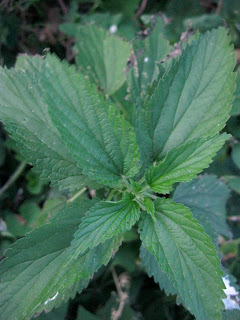Considered by many to be a bothersome pest (weed), the nettle is actually a valuable medicinal and nutritious herb. It has been used since ancient times as a source of food, fiber, and medicinal preparations.
We enjoy our patches in many ways. I would like to share with you some of the information and recipes that we have gathered.
I believe that there are so many things that we have allowed ourselves to consider bothersome pests that God has created for us.
"Then God said, "Let the land produce vegetation: seed-bearing plants and trees on the land that bear fruit with seed in it, according to their various kinds." and it was so." Genesis 1:11
History:
Nettle fiber is similar to that of Hemp or Flax. It was used into the seventeenth century for making cloth, from fine textured fabrics to coarse sailcloth and sacking. Europeans and Native Americans used the nettle fiber to make ropes and fishing nets. During World War I, the German Empire, plagued by textile shortages, used nettles as a substitute for cotton. Captured German uniforms were found to be 85% nettle fiber.
Medicinal Properties:
Nettles has beneficial influence on various body systems, including the lungs, kidneys, skin, and blood. The herb has been recognized for its ability to stop bleeding, relieve mucous congestion and water retention, and improve skin irritations. In the medieval Europe it was used as a diuretic to relieve people of joint pain. According to the University of Maryland Medical Center, studies suggest that it can effectively treat a wide range of health concerns including: urinary problems like urinary tract infections, benign prostatic hyperplasia, hay fever (allergic rhinitis), joint pain, sprain and strains, insect bites. Research has specifically shown that nettle leaf naturally controls histamine.
Nettles are rich in iron, silicon, and potassium. They are very high in vitamins A and C. When dried, nettles are 40% protein. The dried plant makes a nutritious addition to soups, stews, or casseroles.
Gathering/picking:
NETTLES STING- USE GLOVES WHEN PICKING AND HANDLING THE FRESH PLANT. the volatile component is neutralized by heat (cooking or drying). They have a jagged edged leaf and little fine hairs on the stems that sting. Dry nettles at a low temperature. For even drying, separate leaves and stems. Nettles will dry in 8-12 hours.
I would like to share some of the ways that we enjoy our nettles. The spring and summer is the time that we enjoy nettles as a ice tea, since we can get it fresh.
Nettle Ice tea:
- gather about 1/2 - 1 quart of nettles and place in a gallon glass jar
- boil 6 cups of water
- pour boiling water over nettles in gallon jar
- cover and steep for 20 minutes
- remove the leaves (put in compost)
- add 1/3-1/2 cup of honey
- stir
- fill the rest of the gallon jar with cold water and stir
- refrigerate
- enjoy a glass!
Nettle Tea:
- place 1 tbsp. dried nettle leaves in cup
- pour 1 cup of boiling water in cup over the nettles
- cover and steep for 15-20 minutes
- strain the tea through a fine mesh strainer
- add honey, if desired
Nettle Soup:
This soup takes advantage of the young nettle tops. since you are harvesting them in early spring, there is no reason to handle them excessively. Simply cut them to about 4 inches, if they are any longer. As with any soup, try making a day ahead and reheating for best flavor.
Prep time: 30 minutes
Cook Time: 30 minutes
Ingredients:
- 1 lb. fresh nettles (young plants, less than 12 inches tall)
- 1 gallon water or broth
- 3 medium potatoes, cubed
- 2 (or more) cloves garlic
- 1 sweet onion, chopped
- 2 carrots, peeled and sliced
- 1 Tbsp. olive oil
- salt and pepper to taste
- Your favorite soup herbs (like thyme and sweet marjoram)
Preparation: In a large soup pot, saute potatoes, garlic, carrot and onion in oil until almost soft. Remove from pot and add broth or water, bring broth or water to a boil. Add nettles, vegetables, soup herbs, and salt/pepper to taste. simmer until vegetables are cooked through.
Now I hope that you can go out and find some nettles in your yard or come to Finders Keepers and we can pick some :) What a wonderful "weed"!



No comments:
Post a Comment